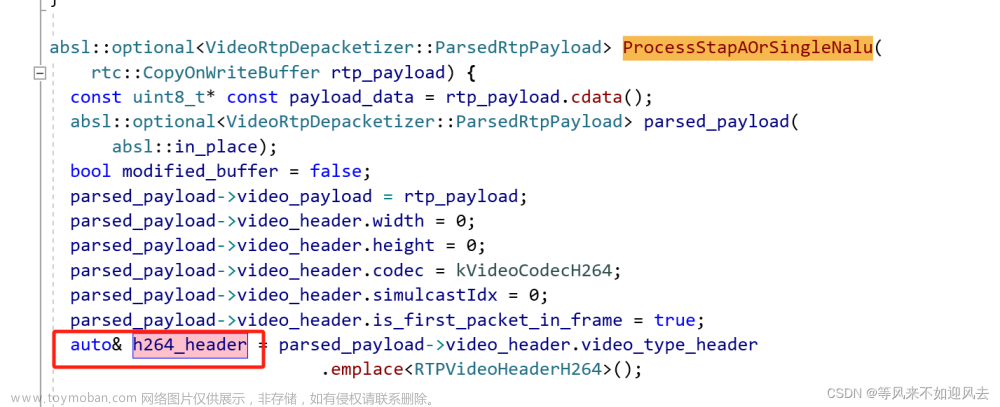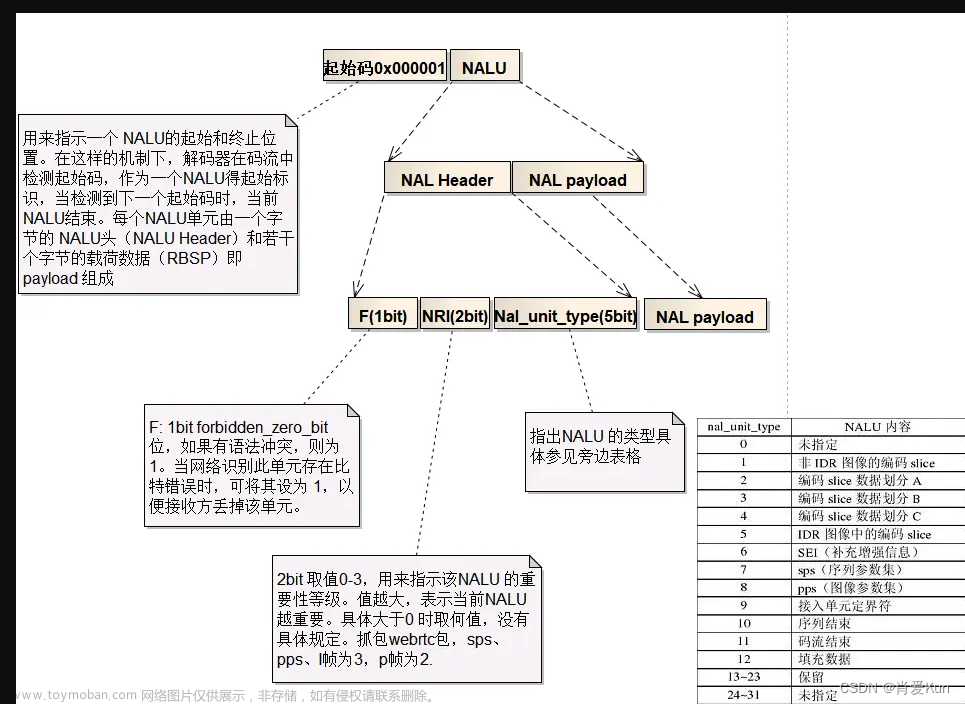安装wireshark
下载抓包工具:首先,您需要下载并安装一个网络抓包工具,例如Wireshark(https://www.wireshark.org)或tcpdump(https://www.tcpdump.org)。这些工具可用于捕获网络流量并保存为pcap或pcapng文件。在这里插入代码片
打开抓包工具:打开所选择的抓包工具,并启动网络监控。
下载rtp_h264_extractor.lua脚本
下载rtp_h264_extractor.lua脚本
--[[
* rtp_h264_extractor.lua
* wireshark plugin to extract h264 stream from RTP packets
*
* Copyright (C) 2015 Volvet Zhang <volvet2002@gmail.com>
*
* rtp_h264_extractor is free software; you can redistribute it and/or
* modify it under the terms of the GNU Lesser General Public
* License as published by the Free Software Foundation; either
* version 2.1 of the License, or (at your option) any later version.
*
* rtp_h264_extractor is distributed in the hope that it will be useful,
* but WITHOUT ANY WARRANTY; without even the implied warranty of
* MERCHANTABILITY or FITNESS FOR A PARTICULAR PURPOSE. See the GNU
* Lesser General Public License for more details.
*
* You should have received a copy of the GNU Lesser General Public
* License along with FFmpeg; if not, write to the Free Software
* Foundation, Inc., 51 Franklin Street, Fifth Floor, Boston, MA 02110-1301 USA
*]]
do
local MAX_JITTER_SIZE = 50
local h264_data = Field.new("h264")
local rtp_seq = Field.new("rtp.seq")
local function extract_h264_from_rtp()
local function dump_filter(fd)
local fh = "h264";
if fd ~= nil and fd ~= "" then
return string.format("%s and (%s)", fh, fd)
else
return fh
end
end
local h264_tap = Listener.new("ip", dump_filter(get_filter()))
local text_window = TextWindow.new("h264 extractor")
local filename = ""
local seq_payload_table = { }
local pass = 0
local packet_count = 0
local max_packet_count = 0
local fu_info = nil
local function log(info)
text_window:append(info)
text_window:append("\n")
end
-- get_preference is only available since 3.5.0
if get_preference then
filename = get_preference("gui.fileopen.dir") .. "/" .. os.date("video_%Y%m%d-%H%M%S.264")
else
filename = "dump.264"
end
log("Dumping H264 stream to " .. filename)
local fp = io.open(filename, "wb")
if fp == nil then
log("open dump file fail")
end
local function seq_compare(left, right)
if math.abs(right.key - left.key) < 1000 then
return left.key < right.key
else
return left.key > right.key
end
end
local function dump_single_nal(h264_payload)
fp:write("\00\00\00\01")
fp:write(h264_payload:tvb()():raw())
fp:flush()
end
local function dump_fu_a(fu_info)
if fu_info.complete == true then
log("dump_fu_a")
fp:write("\00\00\00\01")
fp:write(string.char(fu_info.nal_header))
for i, obj in ipairs(fu_info.payloads) do
fp:write(obj:tvb()():raw(2))
end
fp:flush()
else
log("Incomplete NAL from FUs, dropped")
end
end
local function handle_fu_a(seq, h264_data)
fu_indicator = h264_data:get_index(0)
fu_header = h264_data:get_index(1)
nal_header = bit.bor(bit.band(fu_indicator, 0xe0), bit.band(fu_header, 0x1f))
if bit.band(fu_header, 0x80) ~= 0 then
-- fu start flag found
fu_info = { }
fu_info.payloads = { }
fu_info.seq = seq
fu_info.complete = true
fu_info.nal_header = nal_header
table.insert(fu_info.payloads, h264_data)
log("Fu start: seq = "..tostring(seq))
return
end
if fu_info == nil then
log("Incomplete FU found: No start flag, dropped")
return
end
if seq ~= (fu_info.seq + 1)% 65536 then
log("Incomplete FU found: fu_info.seq = "..tostring(fu_info.seq)..", input seq = "..tostring(seq))
fu_info.complete = false;
return
end
fu_info.seq = seq
table.insert(fu_info.payloads, h264_data)
if bit.band(fu_header, 0x40) ~= 0 then
-- fu end flag found
log("Fu stop: seq = "..tostring(seq))
dump_fu_a(fu_info)
fu_info = nil
end
end
local function handle_stap_a(h264_data)
log("start dump stap nals")
offset = 1 -- skip nal header of STAP-A
repeat
size = h264_data:tvb()(offset, 2):uint()
offset = offset + 2
local next_nal_type = bit.band(h264_data:get_index(offset), 0x1f)
log("STAP-A has naltype = "..next_nal_type..", size = "..size)
fp:write("\00\00\00\01")
fp:write(h264_data:tvb()():raw(offset, size))
offset = offset + size
until offset >= h264_data:tvb():len()
fp:flush()
log("finish dump stap nals")
end
local function on_ordered_h264_payload(seq, h264_data)
local naltype = bit.band(h264_data:get_index(0), 0x1f)
if naltype > 0 and naltype < 24 then
-- Single NAL unit packet
if fu_info ~= nil then
log("Incomplete FU found: No start flag, dropped")
fu_info = nil
end
dump_single_nal(h264_data)
--log("tap.packet: "..", single nal packet dumpped, naltype = "..tostring(naltype)..", len = "..tostring(packet.len))
elseif naltype == 28 then
-- FU-A
handle_fu_a(seq, h264_data)
elseif naltype == 24 then
-- STAP-A
if fu_info ~= nil then
log("Incomplete FU found: No start flag, dropped")
fu_info = nil
end
handle_stap_a(h264_data)
else
log("tap.packet: "..", Unsupported nal, naltype = "..tostring(naltype))
end
end
local function on_jitter_buffer_output()
table.sort(seq_payload_table, seq_compare)
if #seq_payload_table > 0 then
log("on_jitter_buffer_output: seq = "..tostring(seq_payload_table[1].key)..", payload len = "..tostring(seq_payload_table[1].value:len()))
on_ordered_h264_payload(seq_payload_table[1].key, seq_payload_table[1].value)
table.remove(seq_payload_table, 1)
end
end
local function jitter_buffer_finilize()
for i, obj in ipairs(seq_payload_table) do
log("jitter_buffer_finilize: seq = "..tostring(obj.key)..", payload len = "..tostring(obj.value:len()))
on_ordered_h264_payload(obj.key, obj.value)
end
end
local function on_h264_rtp_payload(seq, payload)
--log("on_h264_rtp_payload: seq = "..tostring(seq.value)..", payload len = "..tostring(payload.len))
table.insert(seq_payload_table, { key = tonumber(seq.value), value = payload.value })
--log("on_h264_rtp_payload: table size is "..tostring(#seq_payload_table))
if #seq_payload_table > MAX_JITTER_SIZE then
on_jitter_buffer_output()
end
end
function h264_tap.packet(pinfo, tvb)
local payloadTable = { h264_data() }
local seqTable = { rtp_seq() }
if (#payloadTable) < (#seqTable) then
log("ERROR: payloadTable size is "..tostring(#payloadTable)..", seqTable size is "..tostring(#seqTable))
return
end
if pass == 0 then
for i, payload in ipairs(payloadTable) do
max_packet_count = max_packet_count + 1
end
else
packet_count = packet_count + 1
for i, payload in ipairs(payloadTable) do
on_h264_rtp_payload(seqTable[1], payload)
end
if packet_count == max_packet_count then
jitter_buffer_finilize()
end
end
end
function h264_tap.reset()
end
function h264_tap.draw()
end
local function remove()
if fp then
fp:close()
fp = nil
end
h264_tap:remove()
end
log("Start")
text_window:set_atclose(remove)
log("phase 1")
pass = 0
retap_packets()
log("phase 2: max_packet_count = "..tostring(max_packet_count))
pass = 1
retap_packets()
if fp ~= nil then
fp:close()
fp = nil
log("Video stream written to " .. filename)
end
log("End")
end
register_menu("Extract h264 stream from RTP", extract_h264_from_rtp, MENU_TOOLS_UNSORTED)
end
配置lua脚本
下载上述链接中的文件,将rtp_h264_extractor.lua文件放到wireshark的安装目录下。然后在wireshark安装目录下的init.lua文件末尾添加 dofile(DATA_DIR…”rtp_h264_extractor.lua”)
并且确保disable_lua=false
重启wireshark

筛选
用wireshark加载选定的视频抓包文件后,点击Extra h264 stream from RTP,即可将rtp中的视频数据(h264编码格式)导出成h264文件. 文章来源:https://www.toymoban.com/news/detail-612146.html
文章来源:https://www.toymoban.com/news/detail-612146.html
请记住,由于网络抓包文件通常包含多个协议和数据包,因此在导出H.264裸流之前,确保仅选择包含H.264数据的数据包,以避免保存不相关的数据。此外,使用网络抓包工具时,请务必遵守适用法律和道德准则,并确保合法使用该工具。文章来源地址https://www.toymoban.com/news/detail-612146.html
到了这里,关于wireshark导出H264裸流的文章就介绍完了。如果您还想了解更多内容,请在右上角搜索TOY模板网以前的文章或继续浏览下面的相关文章,希望大家以后多多支持TOY模板网!












